Avoid This Marinara Cooking Mistake If You Want Fresh-Tasting Sauce
If you're cooking marinara sauce (which is different from pizza sauce, by the way), there's one mistake that you want to avoid — especially if you want your sauce to taste as fresh as possible. The mistake in question? Overcooking your sauce. Generally speaking, marinara is a simple sauce that doesn't require much time to get right. "If you [overcook it], you're literally cooking the life out of it," Chef Renee Guilbault, CEO of Harry's Famous Sauce, said to Food Republic.
While some sauces, like a Sunday sauce (that's sometimes referred to as Sunday Gravy), are known for simmering away on the stove for a few hours as different types of meat cook simultaneously, a marinara sauce can be ruined by cooking for too long. "Those bright, vibrant compounds that make tomatoes taste like actual tomatoes? They're delicate little things that disappear when you treat your sauce like a slow-cooked stew," Guilbault said. Instead, he recommends letting it cook for no longer than 30 minutes. "You want just enough time for everything to get acquainted without losing that 'hey, I'm actually a tomato' personality," Guilbault said. When you taste your sauce and notice that it has lost its brightness, it's probably overcooked.
More tips to make the best marinara sauce
While the cook time is crucial to a delicious sauce, there are other ways to take things up a notch. For example, there are some secret ingredients to make the best spaghetti sauce, like using imported canned tomatoes, charred tomato paste, or a touch of sugar. Guilbault also suggests adding a splash of acid at the end of cooking, such as lemon juice or white vinegar. "It's like hitting the refresh button on flavors that cooking dulled," he said. This is also a trick for saving overcooked sauce, since the acid will add a little life back to it.
Additionally, he recommended using sea salt at the start of cooking for its more robust flavor. He suggests tasting the sauce and seasoning it often throughout the cooking process as needed, "instead of relying on marathon cooking sessions to concentrate flavors." To infuse a little more freshness into the dish, make sure to add herbs, like basil or parsley, to help round out the sauce and give it even more complexity. "And always add [the] fresh herbs in the last few minutes, not at the beginning where they'll get cooked into submission." Once you've cooked your marinara sauce, it'll stay fresh in the refrigerator for about four days, or frozen for up to six months.


